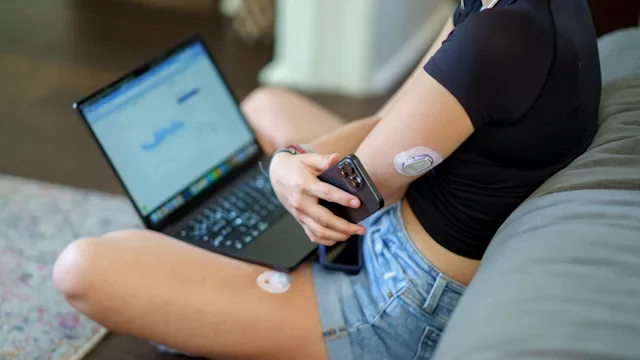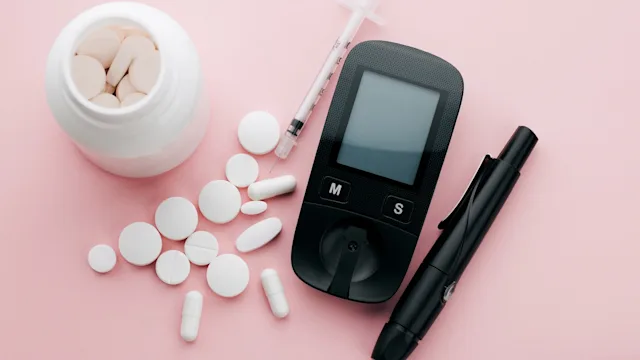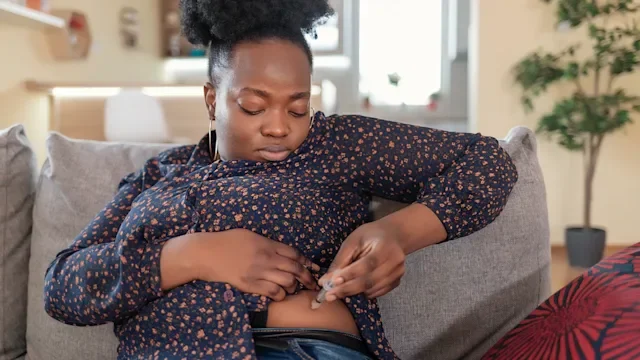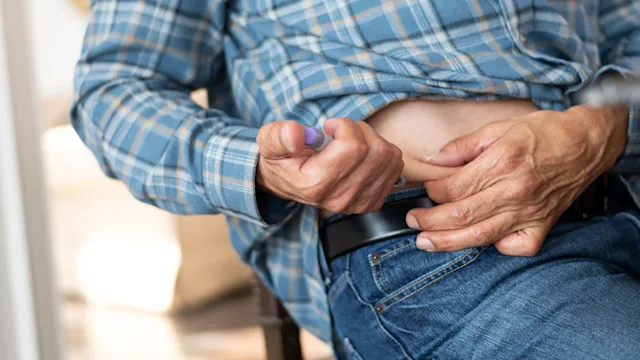Key takeaways:
About 1 in 3 people with diabetes have a related sleep disorder.
The most common diabetes-related conditions and symptoms that affect sleep are excessive urination, low blood sugar, high blood sugar, peripheral neuropathy, restless leg syndrome, sleep apnea, and depression.
If you have diabetes, creating a healthy nighttime routine and practicing good habits throughout the day are important.
Sleep and diabetes are very connected: Studies show that around 1 in 3 people with diabetes have a related sleep disorder. Getting fewer than 6 hours of sleep per night can also increase blood sugar levels and contribute to insulin resistance and diabetes.
The good news is that following a few good sleep hygiene tips can help with some of the symptoms that may be keeping you up at night.
Can diabetes affect sleep?
Yes, diabetes can affect sleep. The most common diabetes-related conditions that can affect sleep are:
Excessive urination (polyuria)
Low blood sugar (hypoglycemia) or high blood sugar (hyperglycemia)
Glucose variability
Peripheral neuropathy
Restless leg syndrome
Depression
Polyuria
Polyuria, or excessive urination, is one of the most common signs of diabetes. And it’s often the first symptom people notice.
When blood sugar is high, the kidneys try to balance levels by pulling in more water and creating more urine. This frequent need to pee can wake you up throughout the night. Nighttime polyuria, or nocturia, may also be connected to sleep apnea.
Hypoglycemia and hyperglycemia
People with diabetes are more likely to have unusually low or high glucose levels (called hypoglycemia and hyperglycemia, respectively). These abnormal levels can have a negative impact on a person’s sleep.
“Low sugar can cause vivid dreams or nightmares. It can also cause restless sleep and sweating,” said Romy Block, MD, a board-certified specialist in endocrine and metabolism medicine. “High sugars can disturb sleep by causing frequent urination and thirst.”
Glucose variability
Blood sugar swings from low to high levels (called glucose variability) are another hallmark symptom of diabetes. These fluctuations are also a common cause of poor sleep and are associated with:
Waking up during the night
Having a harder time falling asleep (sleep latency)
Sleep disturbances
Signs of diabetes: From thirst to tiredness, learn the most common signs of diabetes to watch out for.
Diabetes and rashes: Learn how to identify rashes and skin changes caused by diabetes (with pictures).
Living with diabetes: Read how one woman let go of fear and took control of her diabetes diagnosis.
Peripheral neuropathy
Peripheral neuropathy refers to nerve damage in the peripheral nerves, or any nerves outside of the brain and spinal cord. Diabetes is the leading cause of peripheral neuropathy, and more than half of people with diabetes experience it.
“Many people with diabetes suffer from neuropathy, which can cause burning or numbness in your hands and feet. This can make it difficult to fall or stay asleep,” Block said.
Restless leg syndrome
Also called Willis-Ekbom disease, restless leg syndrome causes uncomfortable feelings in the legs and an intense need to move them. While it can happen at any time of the day, it’s most severe at night when someone is relaxing or lying in bed.
- GlucophageMetformin
- RiometMetformin
- Glucophage XRMetformin ER (Glucophage XR)
Restless leg syndrome is one of the most common causes of sleep deprivation, and it affects people with diabetes at a much greater rate.
Sleep apnea
More than half of those with Type 2 diabetes also have obstructive sleep apnea (OSA), and your risk for OSA goes up even more if you’re overweight.
This sleep disorder develops when the muscles in the back of the throat and tongue become too relaxed and block the airway, preventing normal breathing patterns. People with obstructive sleep apnea can wake up 5 to more than 30 times per hour throughout the night.
“Many overweight people suffer from this condition, and even if they get enough sleep (hours-wise), they don't feel rested because they are not getting quality sleep,” said Kimberly Gomer, MS, RD/LDN, nutrition director at Body Beautiful Miami and former director of nutrition at the Pritikin Longevity Center.
Depression
People with diabetes are more likely to develop depression than those without diabetes, according to a 2017 report. While many people associate depression with too much sleep, it’s actually one of the leading mental health-related causes of insomnia and poor sleep quality.
Can diabetes cause insomnia?
Diabetes can definitely contribute to insomnia — making it hard to fall asleep or stay asleep (or both). In fact, people with diabetes are about 40% more likely to experience insomnia compared to those without diabetes.
How to improve sleep if you have diabetes
Good sleep habits (often referred to as sleep hygiene) can help improve your chances of getting a better night’s sleep. While many of these tips apply to anyone, there are some specific things people with diabetes can do to get some quality shut-eye.
1. Monitor your sugars
Regularly checking your blood sugar level is one of the most important things you can do to get better sleep and improve your health in general.
“Monitoring your sugars during the day and before bedtime allows for corrections and improved control. Continuous glucose monitors can also help,” said Block, who recommends regular visits with your healthcare team to make sure you have the right tools and education to maintain a healthy blood sugar level.
2. Be mindful of what you’re eating
Your nutrition has a major impact on your blood sugar levels.
“The most effective way to keep blood sugar steady throughout the day and overnight is to keep insulin as low as possible,” Gomer said. “This means eating enough protein and vegetables, limiting carbohydrate intake, and avoiding processed carbohydrates, which spike blood sugar. In some individuals who are very carbohydrate intolerant, [this even means] limiting what we think of as healthier carbohydrates such as fruit and whole grains.”
It’s also a good idea to:
Eat dinner earlier in the day.
Limit the amount of carbohydrates in your dinner meal and nighttime snack.
Eat more protein at dinnertime or with a nighttime snack.
Go out for a light walk after dinner. Even just 2 to 5 minutes can help lower your blood sugar and insulin levels.
3. Avoid alcohol before bed
Since alcohol is a depressant, it may seem like it can help you sleep, but it actually works against you. Studies show that alcohol can delay sleep onset (the time it takes you to fall asleep) and decrease overall sleep quality. Alcohol can also make sleep apnea worse and trigger low blood sugar levels that can wake you up in the middle of the night.
4. Prepare your bedroom for sleep
The temperature of your room is one of the most important factors in getting a good night’s sleep. It’s also ideal to keep the temperature between 60°F and 67°F (16°C and 19°C), if possible. Make sure your room is dark by removing electronics and covering the windows with blackout curtains.
5. Get a checkup
If you’re not sleeping well, it’s always best to check in with your healthcare team. Gomer said nighttime blood sugar dips may be caused by too much diabetes medication, so it’s worth making sure your dosage is still correct.
And many people don’t know they have sleep apnea, which can worsen blood sugars, according to Block. “If you snore or have increased daytime sleepiness, talk to your doctor about being evaluated for sleep apnea,” she said.
You can also try these general sleep tips:
Wind down before bed by reading, meditating, and/or listening to relaxing music.
Avoid caffeine within 6 hours of bedtime.
Avoid screens (computer, phone, TV) right before bed.
Go to bed and wake up at the same time every day.
Frequently asked questions
Yes, metformin can cause insomnia in some people, although it doesn’t seem to be very common. If you notice insomnia after starting metformin (or any other medication), let a healthcare professional know. They can help come up with an alternative medication.
Yes. Diabetes causes disrupted sleep, so it can also lead to excessive sleepiness during the day and make you feel tired. In fact, feeling tired and having low energy are some of the early signs of diabetes.
Yes, blood sugar levels that are too high or too low can lead to tiredness and sleepiness. If you’re experiencing increased sleepiness during the day, let a healthcare professional know. They can help you figure out what’s causing it.
Yes, metformin can cause insomnia in some people, although it doesn’t seem to be very common. If you notice insomnia after starting metformin (or any other medication), let a healthcare professional know. They can help come up with an alternative medication.
Yes. Diabetes causes disrupted sleep, so it can also lead to excessive sleepiness during the day and make you feel tired. In fact, feeling tired and having low energy are some of the early signs of diabetes.
Yes, blood sugar levels that are too high or too low can lead to tiredness and sleepiness. If you’re experiencing increased sleepiness during the day, let a healthcare professional know. They can help you figure out what’s causing it.
The bottom line
Many diabetic-related conditions can interfere with your sleep. If you’re not getting enough rest, it’s important to develop a healthy nighttime routine that’s conducive to better sleep quality.
Check in with your healthcare team, too. You may have an underlying condition, like sleep apnea, that can be better managed with the proper treatment.

Why trust our experts?



References
Anyfantakis, D., et al. (2020). Diabetic neuropathy and restless legs syndrome: Can a known chronic condition slow down our diagnostic way of thinking? A case report and a short literature overview. Medicine and Pharmacy Reports.
Buffey, A. J., et al. (2022). The acute effects of interrupting prolonged sitting time in adults with standing and light-intensity walking on biomarkers of cardiometabolic health in adults: A systematic review and meta-analysis. Sports Medicine.
Chasens, E. R., et al. (2002). Nocturnal polyuria in Type 2 diabetes: A symptom of obstructive sleep apnea. The Diabetes Educator.
Chattu, V. K., et al. (2019). The interlinked rising epidemic of insufficient sleep and diabetes mellitus. Healthcare.
Drake, C., et al. (2013). Caffeine effects on sleep taken 0, 3, or 6 hours before going to bed. Journal of Clinical Sleep Medicine.
Fathollahi, A., et al. (2015). Effect of polyuria on bladder function in diabetics versus non-diabetics: An article review. Current Urology.
Gerstenslager, B., et al. (2023). Sleep study. StatPearls.
Hassan, D. (2017). Diabetes and fatigue. Michigan State University Extension.
Khandelwal, D., et al. (2017). Sleep disorders in Type 2 diabetes. Indian Journal of Endocrinology and Metabolism.
Muraki, I., et al. (2018). Sleep apnea and Type 2 diabetes. Journal of Diabetes Investigation.
National Institute of Neurological Disorders and Stroke. (2025). Restless legs syndrome. National Institutes of Health.
Okamoto-Mizuno, K., et al. (2012). Effects of thermal environment on sleep and circadian rhythm. Journal of Physiological Anthropology.
Simou, E., et al. (2018). Alcohol and the risk of sleep apnea: A systematic review and meta-analysis. Sleep Medicine.
Spiegel, K., et al. (2005). Sleep loss: A novel risk factor for insulin resistance and Type 2 diabetes. Journal of Applied Physiology.
Stino, A. M., et al. (2017). Peripheral neuropathy in prediabetes and metabolic syndrome. Journal of Diabetes Investigation.
Surani, S., et al. (2015). Effect of diabetes mellitus on sleep quality. World Journal of Diabetes.
Tsuno, N., et al. (2005). Sleep and depression. Journal of Clinical Psychiatry.
Wiwanitkit, S., et al. (2012). Metformin and sleep disorders. Indian Journal of Endocrinology and Metabolism.












